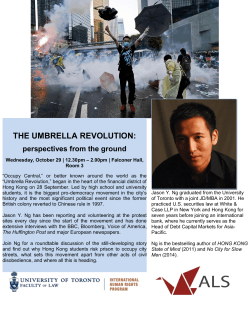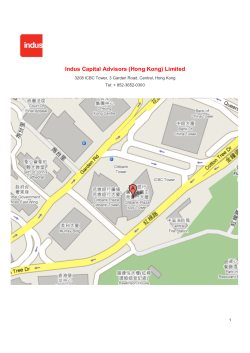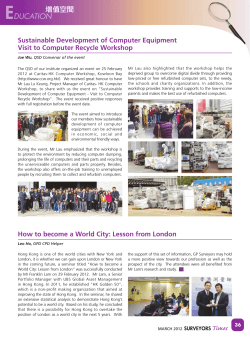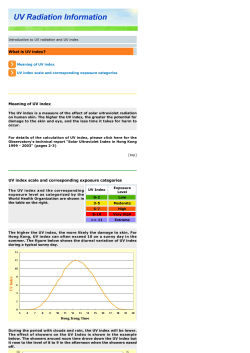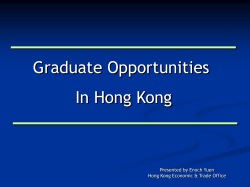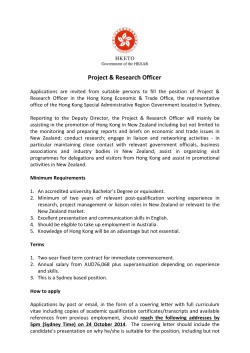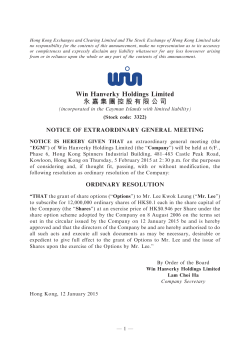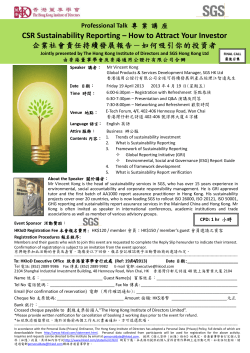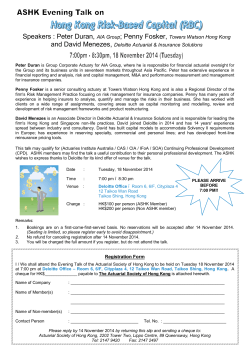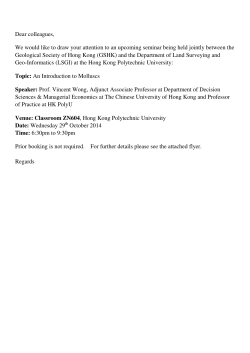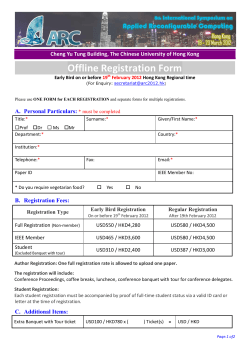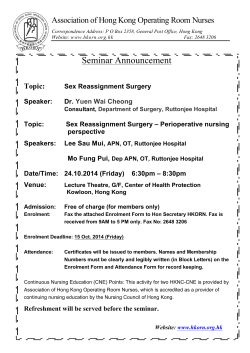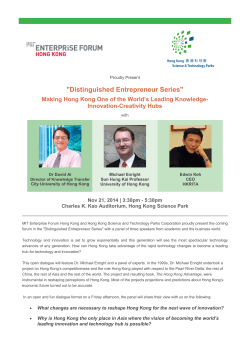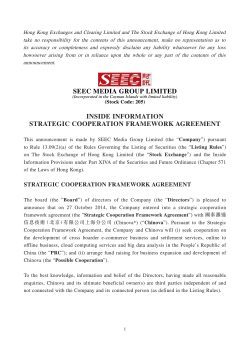
As China fights graft, targets often suffer abuses
ROGER COHEN AMERICAN ‘FREEDOM’ VS. CHINESE ‘HARMONY’ CUBISM’S RISE GENESIS OF A MOVEMENT WAITING IT OUT FED IS UNLIKELY TO CHANGE PLAN PAGE 9 PAGE 10 PAGE 14 | OPINION | CULTURE | BUSINESS ASIA ... TUESDAY, OCTOBER 21, 2014 Tough stance reaffirmed by leader of Hong Kong As China fights graft, targets often suffer abuses HONG KONG BEIJING Open elections a danger to business interests, Leung says in interview Party-led inquiries leave accused with few rights, and guilt is presumed BY KEITH BRADSHER AND CHRIS BUCKLEY BY ANDREW JACOBS AND CHRIS BUCKLEY The Beijing-appointed leader of Hong Kong, Leung Chun-ying, said Monday evening that allowing his successors to be chosen in open elections based on who won the greatest number of votes was unacceptable in part because it risked giving poorer residents a dominant voice in politics. Mr. Leung gave the warning in a broad-ranging defense of his government’s handling of pro-democracy protests that have wracked the city for more than three weeks. He acknowledged that many protesters were angered by the city’s lack of social mobility and affordable housing but argued that containing populist pressures was an important reason for resisting protesters’ demands. Instead, he offered a firm defense of Beijing’s position that candidates to succeed him must be screened by a ‘‘broadly representative’’ nominating committee, which would insulate Hong Kong’s next chief executive from popular pressure to create a welfare state and allow the government to implement more business-friendly policies to address economic inequality. Mr. Leung’s blunt remarks — which seemed to reflect a commonly held view among the Hong Kong elite that the general public cannot be trusted to govern the city well — appeared likely to draw fresh criticism from the democratic opposition and to inflame the street struggle over Hong Kong’s political future, which has been has been fueled in part by economic discontent, especially among younger residents. He spoke on the eve of talks, scheduled to be televised, between his government and student leaders, who have portrayed him as defending a political system He was starved, pummeled and interrogated for days on end in an ice-cold room where sleeping, sitting or even leaning against a wall were forbidden. One beating left Wang Guanglong, a midlevel official from Fujian Province, partly deaf, according to his later testimony. Suicide, he told relatives and his lawyers afterward, tempted him. In the end, he said, he took a deal: He signed a confession acknowledging he had accepted $27,000 in bribes, wrongly believing he would be released on bail and able to clear his name of a crime he says he did not commit. ‘‘He did what they told him to do in order to save his own life,’’ his sister, Wang Xiuyun, said in an interview. China is in the midst of a scorching campaign against government corruption, one that has netted more than 50 high-ranking officials and tens of thousands of workaday bureaucrats as part of President Xi Jinping’s effort to restore public confidence in the ruling Communist Party. In the first half of this year, prosecutors opened more than 6,000 investigations of party officials, according to government statistics released in July. And China’s leaders vow that their cleanout has just begun. But admirers of the antigraft blitz overlook a paradox of the campaign, critics say: Waged in the name of law and accountability, the war on corruption often operates beyond the law in a secretive realm of party-run agencies, like the one that snared Mr. Wang, plagued by their own abuses and hazards. HONG KONG, PAGE 4 Indonesia’s new leader MARK BAKER/ASSOCIATED PRESS Joko Widodo, who was born in a slum, was sworn in on Monday as president of Indonesia, completing an improbable political rise. PAGE 4 Finding resilience amid horror in Liberia MONROVIA, LIBERIA R E P O RT E R’ S N OT E B O O K BY HELENE COOPER Liberians have become accustomed to living with demons. Long before Ebola arrived, the people here endured 14 years of civil war, one that snuffed out 200,000 lives and ignited acts of barbarism that laid waste to the country. The war produced mad generals who led ritual sacrifices of children before going into battle, naked except for shoes and a gun. It produced amphetamine-fueled 10-year-old fight- ers wielding M-16s while toting teddy bear backpacks, and rapists who wore Halloween masks and wedding gowns. When it finally ended in 2003, what was left was a nation of survivors, a place where nearly every person of a certain age has a painful story to tell. I know this all too well, as a native Liberian who emigrated to the United States. My family has its own war stories. One sister was kidnapped and fought to protect her 1-year-old son while marching for days behind rebel lines. Another sister sent her son away to avoid the war and spent two years — two years — hiding deep up country in an area known only as Territory 3C, far from the worst of the conflict, after witnessing gunmen disembowel a co-worker in front of his son. I have long stopped asking people what happened to them during the war. But as I moved in recent weeks around this city where I was born, reporting about the Ebola epidemic, I was aware of this: There is a strength here that I had never before realized. My friend Wael Hariz, a Lebanese citizen living here who had been away for a couple of months, said he came back in late September expecting the worst, after watching the coverage of Ebola overseas. Standing just off Tubman Boulevard, Monrovia’s main road, at midday, he looked at the cars, taxis and pedestrians going by. LIBERIA, PAGE 6 IN U.S., EBOLA SPREADS FEAR AND PANIC In debating how to manage threats to public health, the line between vigilance and hysteria can be blurry. PAGE 6 Hackers dial and redial to steal billions SAN FRANCISCO Phone systems connected by Internet leave small businesses with big bills BY NICOLE PERLROTH GUILLEM VALLE FOR THE NEW YORK TIMES Old city under siege A photograph of La Colmena, a pastry shop that opened in Barcelona, Spain, in 1872. The city’s shops are fighting a shift to global brands. PAGE 15 Bob Foreman’s architecture firm ran up a $166,000 phone bill in a single weekend last March. But neither Mr. Foreman nor anyone else at his seven-person company was in the office at the time. ‘‘I thought: ‘This is crazy. It must be a mistake,’’’ Mr. Foreman said. It wasn’t. Hackers had broken into the phone network of the company, Foreman Seeley Fountain Architecture, and routed $166,000 worth of calls from the firm to premium-rate telephone numbers in Gambia, Somalia and the Maldives. It would have taken 34 years for the firm to run up those charges legitimately, based on its typical phone bill, according to a complaint it filed with the Federal Communications Commission. The firm, in Norcross, Ga., was the victim of an age-old fraud that has found new life, now that most corporate phone lines run over the Internet. The swindle, which on the web is easier to pull off and more profitable, affects mostly small businesses and cost victims $4.73 billion globally last year. That is up nearly $1 billion from 2011, according to the Communications Fraud Control Association, an industry group fi- INSIDE TO DAY ’S PA P E R ONLINE AT INY T.COM Nepal tragedy transcends borders Trying to escape to a life she chooses People from at least seven countries — Canada, India, Israel, Japan, Nepal, Poland and Slovakia — lost their lives in the catastrophic storm that hit Nepal’s Himalayas. WORLD NEWS, 3 The downsides of generous perks MAX ROSSI/AGENCE FRANCE-PRESSE Cardinals listening to Pope Francis on Monday as he spoke of the beatification of Giovanni Battista Montini, who was elected Pope Paul VI in 1963. WORLD NEWS, 4 PATH TO SAINTHOOD Germany has made remarkable progress after being labeled the ‘‘sick man of Europe’’ just 10 years ago, but Jochen Bittner is still worried. OPINION, 9 Tokyo shares rebound strongly The Nikkei 225-share index surged 4 percent on Monday, recovering most of last week’s losses. BUSINESS, 14 The Federal Reserve still plans to wrap up its bond-buying at the end of October, despite market volatility. BUSINESS, 14 NEWSSTAND PRICES TO SUBSCRIBE, CALL: Bali RP 28,000 (including PPN) Hong Kong HK$ 24.00 NEWSSTAND PRICES Hong Kong HK$ 24.00 Seoul Won 2,000 Vietnam US$ 4.00 CURRENCIES Maldives US$ 3.80 Bangladesh Tk. 135.00 Indonesia RP 28,000 (PPN Incl.) E-mail: inytsubs@nytimes.com Manila Peso 100.00 China RMB 29.00 Singapore US$ 4.70 (GST Incl.)Philippines Peso 100.00 Macau 24.00 Sydney A$P8.25 (GST Incl.) Taiwan NT 115.00 &:HJKLNC=UVVUUV:?l@a@m@b@b CHINA, PAGE 4 Sweden searches for submarine In Tunisia, yearning for the old era (852) 2922 1171 In more than a dozen interviews, legal scholars and lawyers who have represented fallen officials said defending them was especially difficult, even by the standards of a judicial system tightly controlled by the party. The biggest challenge, they say, begins the moment an accused official disappears into the custody of party investigators for a monthslong period during which interrogators seek to extract confessions, sometimes through torture. Known as shuanggui, it is a secretive, extralegal process that leaves detainees cut off from lawyers, associates and A Swedish newspaper said the military intercepted a radio transmission from a Russian sub that was perhaps stranded near Stockholm. nytimes.com/europe President Dilma Rousseff is in a tough fight after a former oil executive testified that her party had benefited from a bribery scheme. WORLD NEWS, 5 Germans without angst? HACKERS, PAGE 15 FENG LI/GETTY IMAGES — AGENCE FRANCE-PRESSE President Xi Jinping of China has vowed to keep up the effort to root out corruption. An Afghan woman who was betrothed at age 5 is the subject of a documentary as she tries to avoid the destiny her father had intended for her. nytimes.com/asia More turmoil in Brazil election Almost four years after the uprising that set off the Arab Spring, frustration is such that people often say they wish for a return of the old guard. WORLD NEWS, 6 nanced by carriers and lawenforcement agencies to tackle communications fraud. Major carriers have sophisticated fraud systems in place to catch hackers before they run up false six-figure charges, and they can afford to credit customers for millions of fraudulent charges every year. But small businesses often use local carriers, which lack such antifraud systems. And some of those carriers are leaving customers to foot the bill. The law is not much help, because no regulations require carriers to reimburse customers for fraud the way credit card companies must. Lawmakers have taken the issue up from time to time, but little progress has been made. Bangkok Baht 80.00 Jakarta RP 28,000 (including PPN) Myanmar US$ 4.50 Brunei B$ 8.00 Japan Yen 210 (Tax included.) Nepal NRs 19.50 Cambodia US$ 3.00 Macau P 24.00 Pakistan RS 20.00 China RMB 29.00 Malaysia RM 7.50 Philippines Peso 100.00 Thailand 80.00O, New Territories, Hong Kong. TseungBaht Kwan Taipei NT 115.00 Printed by Superflag Printing and Communication Taiwan NT 115.00 Limited, 1/F., 8 Chun Ying Street, Tseung Kwan O Industrial Estate, IN THIS ISSUE No. 40,934 Books 11 Business 14 Crossword 13 Culture 10 Opinion 8 Sports 12 Steady course for the Fed s s t s Euro Pound Yen S. Franc NEW YORK, MONDAY 11:00AM €1= £1= $1= $1= PREVIOUS $1.2770 $1.2760 $1.6140 $1.6090 ¥106.920 ¥106.870 SF0.9450 SF0.9460 Full currenc y rates Pa ge 17 Some high-tech companies offer topshelf extras like gourmet meals and child care, but critics say this just keeps people at work longer and doesn’t really motivate them. nytimes.com/business Admirable, at least on the field Quarterback Jameis Winston appeared unflappable in leading Florida State to a come-from-behind win, but he has not demonstrated the same maturity on campus. nytimes.com/ncaafootball STOCK INDEXES MONDAY t The Dow 11:00am 16,344.71 t FTSE 100 4pm 6,277.78 s Nikkei 225 close 15,111.23 OIL –0.22% –0.52% +3.98% www.dior.com NEW YORK, MONDAY 11:00AM t Light sweet crude $82.10 –$1.29
© Copyright 2025
